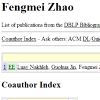| |
   
Guohua Jin,
Luay Nakhleh,
Sagi Snir and
Tamir Tuller. Maximum Likelihood of Phylogenetic Networks. In BIO, Vol. 22(21):2604-2611, 2006.
Keywords: explicit network, likelihood, phylogenetic network, phylogeny, Program Nepal, reconstruction.
Note: http://www.cs.rice.edu/~nakhleh/Papers/NetworksML06.pdf, supplementary material: http://www.cs.rice.edu/~nakhleh/Papers/Supp-ML.pdf.
|
|
| |
|
| |
  
Hyun Jung Park,
Guohua Jin and
Luay Nakhleh. Bootstrap-based Support of HGT Inferred by Maximum Parsimony. In BMCEB, Vol. 10:131, 2010.
Keywords: bootstrap, explicit network, from sequences, lateral gene transfer, parsimony, phylogenetic network, phylogeny, Program Nepal, reconstruction.
Note: http://dx.doi.org/10.1186/1471-2148-10-131.
Toggle abstract
"Background. Maximum parsimony is one of the most commonly used criteria for reconstructing phylogenetic trees. Recently, Nakhleh and co-workers extended this criterion to enable reconstruction of phylogenetic networks, and demonstrated its application to detecting reticulate evolutionary relationships. However, one of the major problems with this extension has been that it favors more complex evolutionary relationships over simpler ones, thus having the potential for overestimating the amount of reticulation in the data. An ad hoc solution to this problem that has been used entails inspecting the improvement in the parsimony length as more reticulation events are added to the model, and stopping when the improvement is below a certain threshold. Results. In this paper, we address this problem in a more systematic way, by proposing a nonparametric bootstrap-based measure of support of inferred reticulation events, and using it to determine the number of those events, as well as their placements. A number of samples is generated from the given sequence alignment, and reticulation events are inferred based on each sample. Finally, the support of each reticulation event is quantified based on the inferences made over all samples. Conclusions. We have implemented our method in the NEPAL software tool (available publicly at http://bioinfo.cs.rice.edu/), and studied its performance on both biological and simulated data sets. While our studies show very promising results, they also highlight issues that are inherently challenging when applying the maximum parsimony criterion to detect reticulate evolution. © 2010 Park et al; licensee BioMed Central Ltd."
|
|
|
|
| |
|
| |
   
Guohua Jin,
Luay Nakhleh,
Sagi Snir and
Tamir Tuller. A New Linear-time Heuristic Algorithm for Computing the Parsimony Score of Phylogenetic Networks: Theoretical Bounds and Empirical Performance. In ISBRA07, Vol. 4463:61-72 of LNCS, springer, 2007.
Keywords: approximation, heuristic, parsimony, phylogenetic network, phylogeny, Program Nepal.
Note: http://www.cs.rice.edu/~nakhleh/Papers/isbra07.pdf.
|
|
| |
|
| |
  
Cuong Than,
Guohua Jin and
Luay Nakhleh. Integrating Sequence and Topology for Efficient and Accurate Detection of Horizontal Gene Transfer. In Proceedings of the Sixth RECOMB Comparative Genomics Satellite Workshop (RECOMB-CG'08), Vol. 5267:113-127 of LNCS, springer, 2008.
Keywords: bootstrap, explicit network, from rooted trees, from sequences, lateral gene transfer, phylogenetic network, phylogeny, Program Nepal, Program PhyloNet, reconstruction.
Note: http://www.cs.rice.edu/~nakhleh/Papers/recombcg-08.pdf, slides available at http://igm.univ-mlv.fr/RCG08/RCG08slides/Cuong_Than_RCG08.pdf.
|
|
|
|
 - forked on GitHub.
- forked on GitHub.






